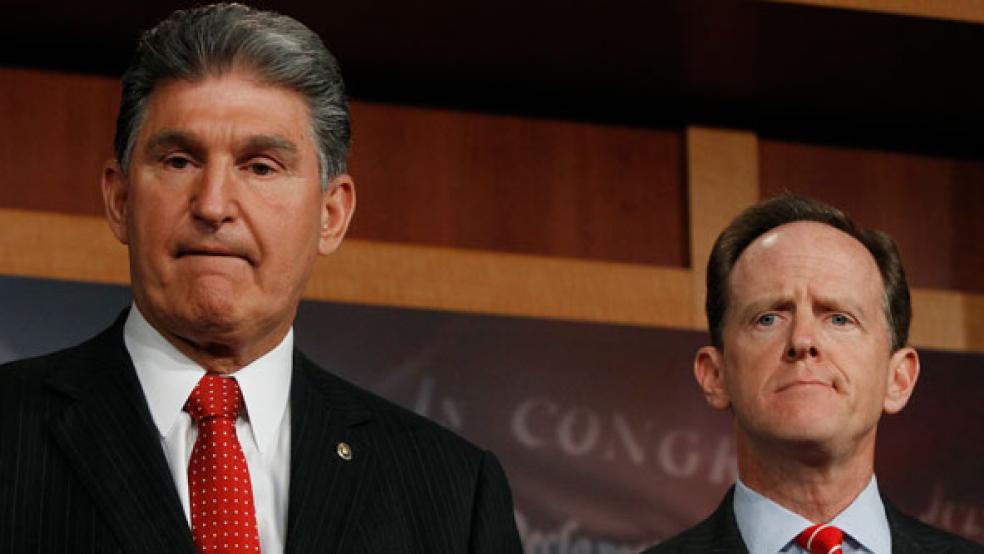Republican President-elect Donald Trump’s decision to fish in Democratic waters for a possible cabinet member or two is smart politics.
He is considering Democratic Sen. Joe Manchin of West Virginia, a former governor from a major coal-producing state for an opening as energy secretary. And he invited Democratic Sen. Heidi Heitkamp of North Dakota, a major booster of both renewable and fossil fuels, for a chat on Friday afternoon at Trump Tower in New York. She, too, is supposedly in the running to head the Department of Energy or the Interior Department.
Related: Return of the Neocons--Trump's Surprising Cabinet Candidates
Trump likely will win kudos for bipartisanship in considering a couple of Democrats for high office, although Gary Cohn, president and chief operating officer of Goldman Sachs, reportedly is also in contention for the energy secretary slot. Trump is also playing a clever game of scrambling the 2018 Senate campaign by threatening to lure a couple of popular Democrats out of the race to enhance his party’s chances of picking up their seats.
Heitkamp issued a statement late Friday saying that she had a “thoughtful and wide-ranging” discussion with Trump that lasted over an hour, covering topics such as the Dakota Access Pipeline controversy, energy infrastructure and the future of coal production. “I look forward to working with him and all of my colleagues in Congress -- both Republicans and Democrats -- to reach results for North Dakota and the country,” she added.
Manchin and Heitkamp have two important things in common: They are centrist Democrats in increasingly red states that went overwhelmingly for Trump in the election. And they are among two dozen Democrats who will be facing reelection in 2018 unless they drop out before then.
Republicans lost several seats in last month’s election and currently hold a 51 to 48 seat advantage. Assuming a Republican wins the Louisiana runoff election scheduled for Dec. 10, that would leave Republicans with a 52-to-48 seat edge. That would pad the GOP’s lead a little, but they would still be well shy of a 60-vote “super majority” that is essential in getting just about anything done in the upper chamber.
Related: Trump the Populist Could Have the Wealthiest Cabinet in History
If Manchin or Heitkamp were to leave the Senate to join the Trump administration, it would be a blow to the struggling Democrats that likely would leave one or the other’s seat more vulnerable to a GOP takeover, either in the short run or two years from now.
In the case of Heitkamp, a new North Dakota state law would require the scheduling of a special election early next year to fill her vacancy. In light of Trump’s strong showing in the state, with 63 percent of the vote, the environment would seem conducive to a Republican winning that seat. Heitkamp barely won four years ago by one percentage point as Republicans gained power in the state.
Meanwhile, Manchin would likely be succeeded by another Democrat chosen on an interim basis by a Democratic governor, Earl Ray Tomblin. However, there’s no telling whether his replacement would match Manchin’s experience and political savvy in retaining the seat two years from now.
That would leave the Republicans just six or seven seats shy of the supermajority they need to surmount a Democratic filibuster.
Related: In First Step Toward Eliminating Obamacare, Trump Names Tom Price to HHS
With the Democrats in the unenviable position of having to defend 25 seats to just eight for the Republicans in 2018, the prospects are fairly good that the Senate GOP will emerge from that election with a commanding majority. Of those 25 endangered senators, 13 are from states that Trump captured or nearly won, according to an Associated Press analysis. Among those states are Maine, Michigan, Pennsylvania and Wisconsin. Five other Democrats are from states that Trump carried by19 percentage points or more — including Indiana, Missouri, Montana, North Dakota and West Virginia.
Ward Baker, executive director of the National Republican Senatorial Committee, the Senate GOP's political organization, told the AP that Democrats facing reelection in two years “should be terrified.”
This fact might help to explain why congressional Republican leaders are predicting that it will take two or more years to devise a replacement for Obamacare after the GOP makes good on its vow to repeal the Affordable Care Act as one of its first actions in January. The congressional Republicans will have no trouble next month using arcane budget “reconciliation” rules to pass the Obamacare repeal legislation with a simple majority of 51 votes in the Senate.
However, they will have to follow regular order in the future to adopt comprehensive legislation to supplant the existing law. And that means they will need at least 60 votes in order to invoke cloture and break a Democratic filibuster.
Related: Ryan Declares GOP Has a ‘Mandate’ to Enact Sweeping Changes
There is no way, of course, of knowing what the political landscape will look like a year or two from now, after Trump takes charge and presses his agenda of mass deportation of illegal immigrants, building a wall along the southern border, repealing Obamacare and so on. And historically, the party that wins control of the White House suffers losses in Congress in the following mid-term election.
Trump rewrote the political playbook in 2016 – defying all expectations -- and he may reap additional political clout two years from now by helping his party increase its margin in the Senate and House. But Larry J. Sabato, a University of Virginia political scientist, cautioned that there’s no way of predicting voters’ moods after they get a two-year dose of Trump’s policies and personality.
“Let’s remember, Trump lives dangerously and he can’t even hit 50 percent favorability now,” Sabato said in an email late last week. “If Trump is very unpopular in 2018, there’s very little chance the GOP will hit 60.”





